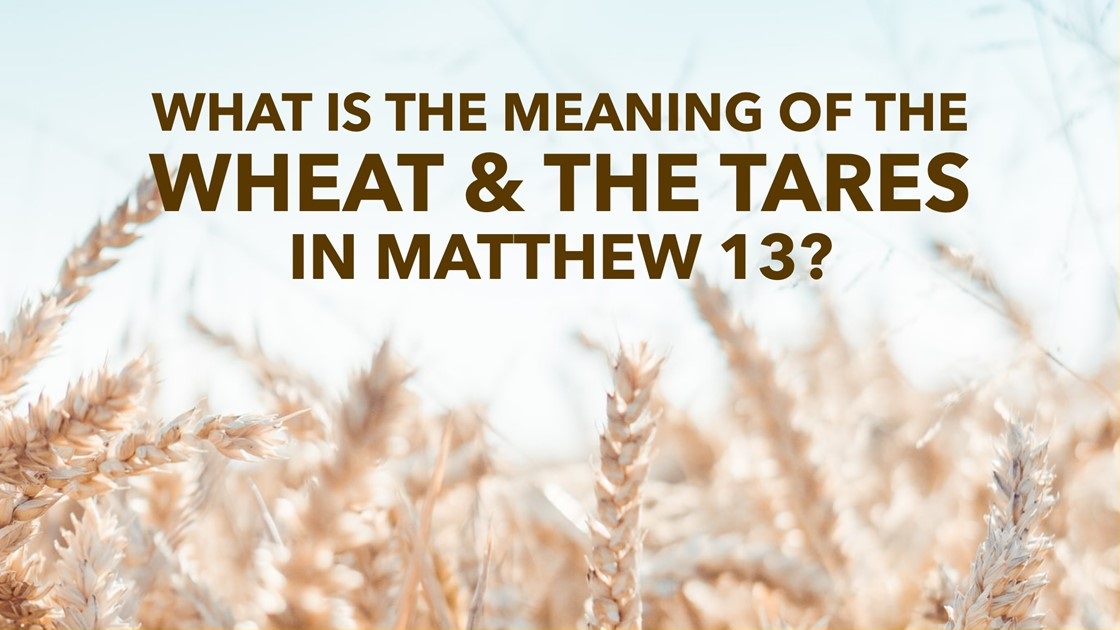One of the parables of Matthew 13 speaks of tares sown among the wheat, and the passage has often been used in a way that leads saved people to doubt their salvation. What drives their questioning is a shift of focus away from Jesus, the object of faith, and toward the subject of faith—themselves and ultimately their personal performance in living for God. Examining failures and fruitless pursuits while holding an incorrect focus can cause some to despair and doubt their salvation. Is this the intended meaning of the parable?
Jesus first speaks the parable and then comments on it.
“Another parable put he forth unto them, saying, The kingdom of heaven is likened unto a man which sowed good seed in his field: But while men slept, his enemy came and sowed tares among the wheat, and went his way. But when the blade was sprung up, and brought forth fruit, then appeared the tares also. So the servants of the householder came and said unto him, Sir, didst not thou sow good seed in thy field? from whence then hath it tares? He said unto them, An enemy hath done this. The servants said unto him, Wilt thou then that we go and gather them up? But he said, Nay; lest while ye gather up the tares, ye root up also the wheat with them. Let both grow together until the harvest: and in the time of harvest I will say to the reapers, Gather ye together first the tares, and bind them in bundles to burn them: but gather the wheat into my barn” (Matthew 13:24-30).
When the disciples asked Jesus to explain, “He answered and said unto them, He that soweth the good seed is the Son of man; The field is the world; the good seed are the children of the kingdom; but the tares are the children of the wicked one; The enemy that sowed them is the devil; the harvest is the end of the world; and the reapers are the angels. As therefore the tares are gathered and burned in the fire; so shall it be in the end of this world. The Son of man shall send forth his angels, and they shall gather out of his kingdom all things that offend, and them which do iniquity; And shall cast them into a furnace of fire: there shall be wailing and gnashing of teeth” (Matthew 13:37-42).
On the surface, tares look like wheat. This is clear. The similar look reveals that tares do not refer to those who lack “outward evidences” of salvation. Such proofs of salvation are keenly in focus for believers that emphasize performance and have started to doubt. But the tares here look like good wheat; they too look good though they have been sown by the enemy. Therefore, tares are not those who look fleshly. Tares are those that have embraced the devil’s lie of works-salvation. Sincere, unsaved moralists look good, but they are not saved because they embrace the wrong doctrine of works-salvation. In the end, the wheat bends over with the weight of the seeds, picturing humility. The tares stand taller, picturing the pride of self-righteousness. Examples might include self-dependent Roman Catholics and Mormons who live moral lives but trust in their self-righteous works instead of Jesus alone as the only Savior.
While believers ought to evidence their salvation (and have the provision to do so through the indwelling Spirit), living out one’s salvation is not automatic. It’s by faith. Believers still face the opposition of the flesh and Spirit (Gal. 5:17). When a believer yields to the flesh, the works of the flesh are manifest (Gal. 5:19-21). When a believer yields to the Spirit, the fruit of the Spirit is manifest (Gal. 5:23-23). Therefore, a single regenerated person can “evidence” either works of the flesh or the fruit of the Spirit depending on what choices are made, whether choices of faith or choices of unbelief. Tragically, when a believer indulges the flesh, they look like what they are not because saved flesh and unsaved flesh look the same. But the point of the parable is the tares do not look like the works of the flesh; they imitate what is good.
In the time of Jonathan Edwards and the First Great Awakening, some advocated rooting out what they considered tares because some new believers did not consistently live right. Edwards, however, wisely rejected this notion on the basis of our passage, fearing they would unwittingly uproot the wheat while pulling up the tares. Causing saved people to doubt their salvation “uproots” the wheat by moving people off the ground of faith that is essential for growth.

John Van Gelderen
Post Author












Thank you for this good explanation! I struggled for years with assurance of salvation. So thankful that my assurance is not based on my performance. It’s based on His!
That’s a great understanding. So many times we can consider our own works or the works of others to prove one’s salvation. The truth remains “He will hold me fast”.
Amen! Thank you for expounding on this. I praise the Lord that my salvation and sanctification is not based on my own merit or performance!